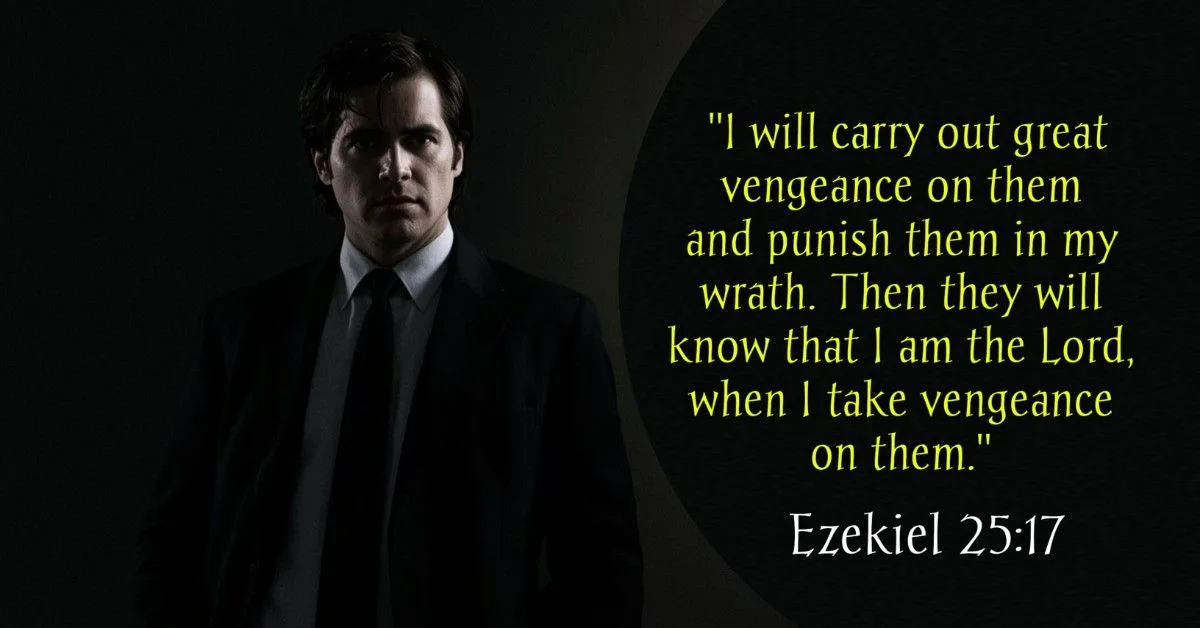There’s a moment in the movie Pulp Fiction that stays with you long after the credits roll. Samuel L. Jackson’s character, Jules Winnfield, calmly delivers a line that sounds like a Bible verse powerful, spiritual, and deeply intense.
But many still wonder: what Bible verse is quoted in Pulp Fiction, and is it even real? He calls it Ezekiel 25:17, but when you actually open a Bible, it doesn’t match what he says.
So what’s going on here? Let’s explore the truth behind this unforgettable cinematic moment.
The Famous Verse from the Movie
Jules’s quote begins dramatically:
“The path of the righteous man is beset on all sides by the inequities of the selfish and the tyranny of evil men…”
And it ends with the chilling line:
“And you will know I am the Lord when I lay my vengeance upon thee.”
These words sound deeply biblical and that’s intentional. They strike the heart like a sermon, full of weight and judgment. But here’s the twist: most of this speech doesn’t appear anywhere in the Bible.
What Ezekiel 25:17 Really Says
If you turn to the King James Version, here’s what Ezekiel 25:17 actually says:
“And I will execute great vengeance upon them with furious rebukes; and they shall know that I am the Lord, when I shall lay my vengeance upon them.”
It’s a strong declaration from God, directed at the Philistines a warning of divine judgment. But notice what’s missing: there’s no mention of a “righteous man,” a “shepherd,” or the “valley of darkness.”
Those phrases? Completely added for cinematic effect.
Why Did Tarantino Use This Verse?
Director Quentin Tarantino wasn’t trying to preach. He wanted something that felt spiritual yet sounded dangerous. So he took a real verse, added fictional language (inspired by a 1970s Japanese film), and created a monologue that made Jules sound both holy and terrifying.
But something deeper unfolds.
By the end of the film, Jules reflects on the quote. He admits he never really understood it he just used it to sound cool before killing someone. But now, after surviving a gunfight, he feels different.
He says:
“I’m tryin’, Ringo. I’m tryin’ real hard to be the shepherd.”
He no longer sees himself as the righteous man but as the evil man, trying to choose a new path. And that, right there, is the moment of transformation.
A Fictional Quote, A Real Message
Even though the verse in Pulp Fiction is mostly fictional, its impact is real. It makes us pause. It makes us ask:
Am I walking the righteous path or am I just reciting words without truly living them?
That’s the beauty of the Bible. Even when misquoted or taken out of context, it still has the power to stir something deep within the soul. And sometimes, that’s all God needs to begin a change.
Final Thoughts
The scene in Pulp Fiction may not quote the Bible word-for-word but it stirred hearts, sparked Google searches, and led thousands to open their Bibles and read Ezekiel 25:17 for themselves.
And maybe that’s the real lesson:
God can use anything even a Tarantino film to get someone thinking, questioning, and searching.
That’s the power of His Word.
Even when misquoted… it still speaks.
FAQs: What Bible Verse Is Quoted in Pulp Fiction?
What Bible verse is quoted in Pulp Fiction?
Ezekiel 25:17 is quoted, but the version in the movie is a modified and fictionalized version.
Is Ezekiel 25:17 real in the Bible?
Yes, but the film adds dramatic lines that are not found in any Bible translation.
Why did Jules use the verse in Pulp Fiction?
He uses it as a threat, but later it leads to his personal awakening and a decision to change.
Why did Jules use the verse in Pulp Fiction?
He uses it as a threat, but later it leads to his personal awakening and a decision to change.
Glory to God even through Hollywood moments.
Sometimes, the Word finds its way into the world in the most unexpected ways.

